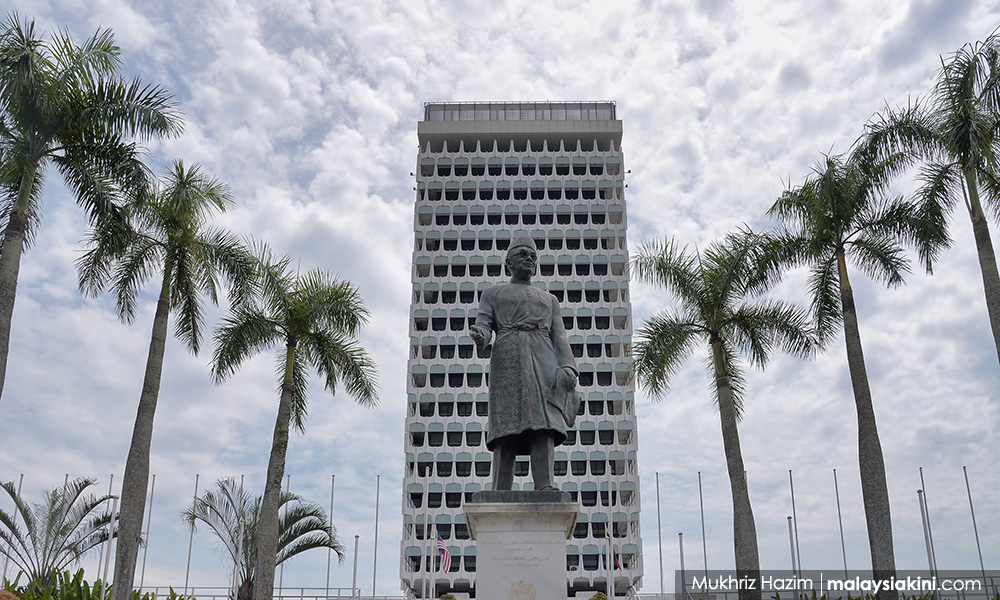
Published by Malay Mail & Free Malaysia Today, image from Quartz.
Recent political crises — from the collapse of the previous Pakatan Harapan (PH) government to a change in government by Perikatan Nasional (PN) have highlighted how politicians are placing their own selfish interests over the struggle for rakyat.
The people are already tired of the farces played by all the political “frogs,” which in general ignore the rakyat’s mandate.
They long for new, principled and ethical politicians to emerge in the political arena, to lead the country to the right way as well as to set Malaysia free from the notorious mud of money politics, kleptocracy, non-fulfilment of manifesto promises and political appointments at GLCs.
Hence, a new political culture based on integrity, ethics and service for the public good is very much needed and anticipated.
The dilemma facing current politics is that most politicians prioritise personal interest than public interest.
In their public persona, they will always say they entered politics for the sake of the 3Rs — rakyat, religion and race — but in actual fact it’s for the sake of the 3Ms — me, me and me.
When asked about why they would want to switch side and support their former rival, the official and standard answer will often be “this is for the development needs of their electorate.”
Is this argument justifiable enough to defend their acts?
Well, this is true given the unequal federal-state relations in Malaysia which prompts the state assemblymen to incline to the ruling federal government in hope of obtaining more funds for their constituencies. And this is another issue which requires more government effort to tackle.
However, the rakyat generally perceives this as a cover for the politician’s greed and his personal craving for power.
The political reality in Malaysia lies within party politics where the political party is the be-all and end-all of things.
Leaving aside the debate on the pros and cons of party politics, the fact is the voters vote according to the party, not the candidate itself.
Hence, the mandate of the rakyat or the public interest is deeply intertwined with the political party. Seen from this perspective, party hopping is deemed against the will of the electorate.
But mandate of the rakyat could also be seen as the rakyat having no mandate at all in term of choice. The rakyat is “forced” to choose candidates chosen by the parties because it is the party who chooses the candidates not the rakyat.
Thus, the mandate of the rakyat is just limited to electing the candidates decided by the parties. The choice of candidates is actually the mandate of the parties. Put it bluntly, the rakyat has only the mandate to elect, while the party has the mandate to choose.
Then there is the individual mandate of the candidates to accept their nomination by the parties. The assumption is they would normally accept if the stance, principles and beliefs of the party is in alignment with theirs.
This imply at any moment after winning the election, if the candidates decide or perceive there is a dichotomy between the stance, principles and beliefs of their party and theirs, they have the right to hop.
And this right to hop is recognised in the Constitution via the right of association and assembly as enshrined in Article 10(1)(c) of the Federal Constitution. But there are others who say even though party hopping is constitutional, anything in the constitution that is detrimental to the rakyat can be removed by amending it.
But at this moment amending the constitution is a no brainer. As pointed out by an Umno former minister Dauk Sri Nazri Aziz, given the current political fragmentation in parliament, a constitutional amendment that needs a two-thirds majority is almost impossible and unrealistic.
He went on to propose a party-list system in which the party winning a particular constituency will always hold that constituency and the incumbent hopper will lose his seat.
Although this requires a two-thirds majority, Nazri felt this is more palatable in getting the support of the majority of the parliamentarians.
Another way is through the implementation of recall elections in which the politician’s defection is put to a vote by its electorate, an idea advocated by Professor Wong Chin Huat, a political scientist from Sunway University, which is a practice in some states in the US.
The current political culture that prioritises personal interest than public interest is not just immoral and inappropriate in its nature, but it is unhealthy to the political development, economic progress, well-being of the society as well as other aspects of the nation.
It ignites the political instability which is strongly felt by rakyat at this moment. Since the political crisis that began in February, several PH state governments had collapsed, with the Sabah state government being the latest, having to hold a snap election on September 26.
The current political culture also simultaneously has an impact on the economy in terms of the uncertainties it engenders and the cost of organising a snap election at the federal level, that could probably explain the net capital outflow on a daily basis despite the good performance of the stock exchange.
All these lead to a trust deficit towards politics and government too. If this persists, the legitimacy of the current government will always be questioned.
As it is impossible for any one party in Malaysia to form the government, this new political culture should be the basis and maxim of coalition politics in Malaysia.
It is by no means a “be-all and end-all” solution to the current dilemma. However, by promoting and endorsing this new political culture, all the drawbacks induced by the present situation will be alleviated to a certain degree.
Also, this new political culture suits the interest of both the ruling coalition as well as the opposition, as they have been greatly affected by the party hopping practice, hence they have the incentive to incubate and promote the new political culture.
The point is this nation is in urgent need of a new political culture that is based on integrity, ethics and service for the public good.
Jamari Mohtar and Lim Ji Yi are part of the research team at EMIR Research, an independent think tank focused on strategic policy recommendations based on rigorous research.
Diterbitkan oleh Malaysiakini, gambar-gambar daripada Malaysiakini.
Krisis politik baru-baru ini – dari kejatuhan kerajaan Pakatan Harapan (PH) hingga ke perubahan pemerintahan Perikatan Nasional (PN) – telah menyoroti bagaimana ahli politik menekankan kepentingan mereka berbanding perjuangan untuk rakyat.
Rakyat sudah bosan dengan drama “katak” politik mereka yang secara umumnya mengabaikan mandat rakyat.
Mereka sangat merindukan kemunculan ahli politik baru yang berprinsip dan beretika di arena politik.
Bagi memimpin negara ke arah yang betul dan juga untuk membebaskan Malaysia daripada lumpur politik wang, kleptokrasi, pemungkiran janji manifesto dan pelantikan politik di syarikat-syarikat berkaitan kerajaan.
Oleh itu, budaya politik baru yang berlandaskan integriti, etika dan perkhidmatan untuk kebaikan awam sangat diperlukan dan diharapkan pada masa ini.
Dilema yang dihadapi oleh politik semasa ialah kebanyakan ahli politik mengutamakan kepentingan peribadi daripada kepentingan awam.

Apabila tampil di tempat awam, mereka selalu mengatakan tujuan mereka memasuki politik adalah demi rakyat, agama dan bangsa tetapi hakikatnya adalah demi aku, aku dan aku.
Ketika ditanya mengapa mereka ingin berpihak dan menyokong bekas lawan politik mereka, jawapan yang sering kedengaran adalah:
“Ini untuk keperluan pembangunan kawasan undi mereka.”
Jawapan ini betul kerana pengagihan kuasa antara persekutuan dengan negeri-negeri di Malaysia yang tidak setara mendorong ahli dewan undangan negeri cenderung kepada kerajaan persekutuan yang berkuasa demi memperoleh lebih banyak dana untuk kawasan undi mereka.
Dan ini merupakan satu isu berlainan yang memerlukan lebih banyak usaha kerajaan untuk mengatasinya.
Namun, rakyat pada umumnya menganggap ini sebagai satu alasan untuk mengaburi kerakusan ahli politik dan kehendak peribadi terhadap kuasa.
Realiti politik di Malaysia berkait rapat dengan politik parti di mana parti politik ialah segala-galanya.
Mengetepikan perdebatan mengenai kebaikan dan keburukan politik parti, hakikatnya pengundi memilih mengikut parti, bukan calon itu sendiri.
Oleh itu, mandat rakyat atau kepentingan umum berkait rapat dengan parti politik. Dilihat dari perspektif ini, melompat parti dianggap bertentangan dengan kehendak pengundi.
Konsep mandat
Tetapi konsep mandat rakyat itu juga dapat dilihat sebagai rakyat tidak memiliki mandat sama sekali dari segi pilihan.
Rakyat bagaikan “dipaksa” untuk memilih calon yang dipilih oleh parti kerana partilah yang memilih calon bukan rakyat.
Lantaran itu, mandat rakyat hanya terbatas pada mengundi calon-calon yang dipilih parti-parti politik.
Pemilihan calon sebenarnya ialah mandat parti.
Rakyat hanya memiliki mandat mengundi calon, sedangkan parti memiliki mandat memilih calon.
Terdapat satu lagi mandat individu calon tersebut – sama ada dia menerima pencalonan parti.
Andaiannya, mereka biasanya akan menerima jika pendirian, prinsip dan ideologi parti itu bersesuaian dengan pegangan mereka.
Ini bermakna pada bila-bila masa setelah memenangi pilihan raya, jika calon-calon tersebut membuat keputusan atau menganggap adanya percanggahan antara pendirian, prinsip dan ideologi parti dengan pegangan mereka sendiri, mereka berhak untuk melompat parti.
Dan hak melompat ini diiktiraf dalam Perlembagaan melalui hak kebebasan untuk berpersatuan dan berhimpun yang termaktub dalam Artikel 10 (1) (c) Perlembagaan Persekutuan.
Tetapi ada juga berpendapat meskipun lompat parti dibenarkan oleh perlembagaan, namun apa sahaja dalam perlembagaan yang memudaratkan rakyat dapat digugurkan dengan memindanya.
Tetapi pindaan perlembagaan memerlukan undian majoriti dua pertiga dan dalam iklim politik masa kini agak sukar dan mustahil untuk mendapatkan majoriti tersebut.
Mantan menteri Umno, Nazri Aziz menyarankan sistem parti yang memenangi kawasan pilihan raya tertentu akan tetap memegang kawasan pilihan raya itu.

Bermakna wakil rakyat yang melompat parti akan kehilangan keahliannya di parlimen.
Walaupun ia memerlukan majoriti dua pertiga namun ia berkemungkinan besar mendapat sokongan majoriti ahli-ahli parlimen, katanya.
Satu lagi cara lain membendung budaya lompat parti adalah melalui pelaksanaan pilihan raya kecil semula di mana keputusan ahli parlimen untuk meninggalkan partinya disahkan oleh para pengundi.
Budaya politik semasa yang mengutamakan kepentingan peribadi daripada kepentingan awam bukan sahaja tidak bermoral dan tidak betul.
Selain itu, ia tidak sihat untuk perkembangan politik, kemajuan ekonomi, kesejahteraan masyarakat dan juga aspek-aspek lain di negara ini.
Ia juga secara serentak memberi kesan kepada ekonomi dari segi ketidaktentuan dan kos mengadakan pilihan raya segera di peringkat persekutuan. Ini mungkin dapat menjelaskan kenapa aliran keluar modal bersih berlaku setiap hari.
Kesemua ini menimbulkan defisit keyakinan terhadap politik dan kerajaan.
Sekiranya ini berterusan, kedudukan kerajaan sekarang akan sering kali dipersoalkan.
Oleh kerana tiada satu parti di Malaysia yang dapat membentuk kerajaan dengan sendirinya, budaya politik baru ini seharusnya menjadi asas dan prinsip politik gabungan di Malaysia.
Tambahan pula, budaya politik baru ini selaras dengan kepentingan gabungan parti yang memerintah serta parti-parti pembangkang, kerana masing-masing terkesan dengan budaya lompat parti, lantas mempunyai iltizam untuk menyemai dan menggalakkan budaya politik baru ini.
Jamari Mohtar dan Lim Ji Yi merupakan penyelidik di EMIR Research sebuah organisasi pemikir bebas yang berfokuskan kepada pencernaan saranan-saranan dasar strategik berteraskan penyelidikan yang terperinci, konsisten dan menyeluruh.

